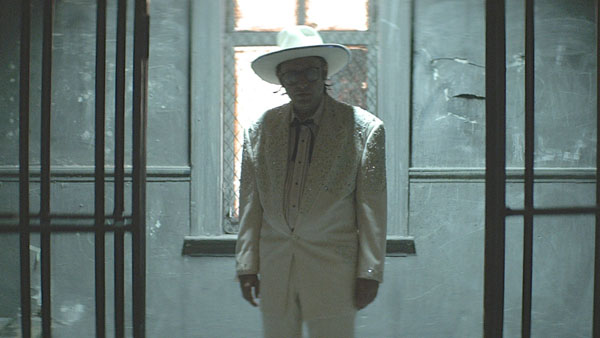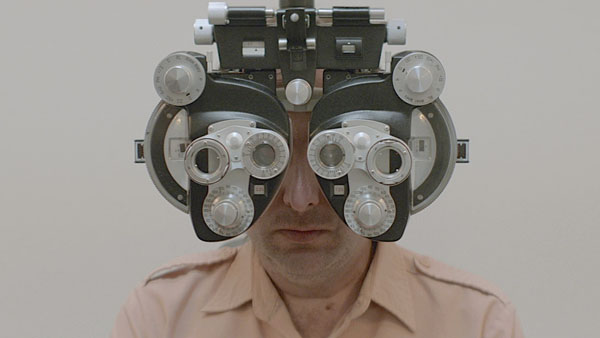“Rick Alverson has made some absorbing and intimate indie works,” begins Rodrigo Perez at the Playlist. “The Builder is a terrifically underrated gem, and New Jerusalem coaxes another strong lead performance by musician Will Oldham. But it’s Alverson’s provocative and pointed collaborations with comedian Tim Heidecker that have proven to be layered and rich next-level works. The deeply misunderstood The Comedy—a hilariously confrontational, but also alarming examination of the age of ironic distance—is an incendiary piece de resistance. But Alverson may have outdone himself with Entertainment, an even more abrasive, alienating and nightmarish masterwork about the cruel futility of connection, performance and existence.”
For Variety‘s Scott Foundas, The Comedy (2012) is “an extravagantly rude, confrontational and surprisingly poignant study of a dissolute New York slacker waiting to inherit his dying father’s fortune.” And Entertainment is “an even darker, weirder odyssey through a soulless American nowhere, with perhaps the world’s most abrasively unfunny insult comic as our guide. But take it or leave it, Alverson’s fourth feature is singular stuff, and it reconfirms the director as one of the truly bold voices in the all-too-homogenous U.S. indie film scene.”
“Entertainment, which stars the comedian Gregg Turkington as a failing standup comedian, staggers through a landscape of wretched bars, comedy dumps and loser towns in a shell-shocked haze of fed-up existential disgust,” writes Jordan Hoffman for the Guardian. “Each moment of this despicable charade we call life, it says, brings us closer to the final indignity that will spark total emotional collapse. It is, if you are watching in the right frame of mind, hilarious.”
“A cinematic suicide note unspooling against parched Southwestern landscapes, the film should find support from fans of star Gregg Turkington, whose anti-comedy persona Neil Hamburger has flummoxed audiences for over two decades,” writes John DeFore in the Hollywood Reporter. “Comparisons to Tony Clifton come close to the mark, but Tony had more joie de vivre.”
“When not performing, The Comedian is a withdrawn everyman who bides his time taking tours of desert landmarks and leaving voicemails for his daughter,” writes Michael Tully at Hammer to Nail. “On stage, however, he’s something else entirely, a distorted version of a sloppy lounge comedian: tuxedo, three drinks in hand, greasy comb-over, and an assault of material that mixes non-jokes with one-liners that are as politically incorrect as the human language can get… As The Comedian makes his way through the barren wasteland in and around Bakersfield [California], he reunites with his cousin John (John C. Reilly) before encountering a steady array of off-kilter strangers (Michael Cera, Amy Seimetz, David Yow—all brief, all great). At the film’s midway point, he has an exchange with a loopy chromotherapist (Lotte Verbeek) that may be the cause of the ensuing hallucinatory chaos that follows.”
“It’s here that Entertainment flies off the rails,” writes Indiewire‘s Eric Kohn, who gives the film an A- nonetheless. On the other hand, Michael C at the Film Experience: “It’s difficult to pinpoint exactly why exactly this film is inert to the same degree The Comedy was electric. Both engage in a game of brinksmanship with the audience, testing the limits of how much aggressive unpleasantness they are willing to endure. Maybe its because underneath it all The Comedy held out a measure of pity for its protagonist, even some lingering shred of hope in its cleansing final scene. Entertainment has no such soul.”
“The film hits the same note of deadpan depression over and over again, until shock calcifies into boredom,” finds the AV Club‘s A.A. Dowd. “Alverson, whose formal chops are undeniable, makes movies like no one else. Entertainment presents the inadvertent case that maybe he shouldn’t make them like this anymore either.”
At Filmmaker, Alicia Van Couvering has five questions for Alverson and Ioncinema‘s Eric Lavallee gets a few words with Tarkington.
Updates, 1/31: “Ultimately, I admired Alverson’s audience-testing indulgences more than I actively enjoyed them,” writes Noel Murray at the Dissolve. “I never felt any cumulative emotional or aesthetic effect from all the monochrome melancholy.”
“Alverson delights in making people uncomfortable,” writes David Ehrlich at Little White Lies, “but his gently sadistic touch is always a means to an end—The Comedy is built around set pieces designed to make your skin crawl, but the film eventually coheres into a lucid and elegiac treatise about irony as the toxic fuel of modern remove. Entertainment may not be quite as unnerving, but neither is it quite as willing to show its cards and reveal its purpose. If The Comedy let us in on the joke, Entertainment makes us part of the act.”
This is “a film that feels to be at the complete and utter mercy of its maker,” writes Sarah Salovaara at Filmmaker. “Working with Heli cinematographer, Lorenzo Hagerman, Alverson has also achieved a beautiful sense of formality, a sharp contrast to The Comedy’s roving camerawork. The wide static shots in bars and the desert only reinforce The Comedian’s detachment, to a most entrancing effect.”
For Ben Umstead at Twitch, “if one thing is clear coming out of Sundance this year, it is that Alverson and Tangerine director Sean Baker are two of America’s most vital filmmakers working right now. They are on opposite ends of subject and approach, yes, but like Baker, Alverson is making consistently challenging and equally entertaining fare.”
At the Film Stage, Jack Giroux gives Entertainment a B. Ioncinema‘s Eric Lavallee talks with producer Ryan Zacarias and Indiewire hands its Sundance questionnaire to Alverson.
Update, 2/1: “This is a movie that is about as enjoyable as embracing a cactus,” writes Alison Willmore at Buzzfeed. “But once it starts to feel like Entertainment’s protagonist is actually stuck in some ironic, awful purgatory, waiting and waiting for someone to tell him it’s time to go home, it’s difficult to shake the movie off, even long after it’s over.”
Updates, 3/17: For Chris Cabin at Slant, “this is more than a bleak comment on performance, as Alverson’s perfectly composed framings and eye for revealing symbols conjure a menacing perspective on how the titular occupation hulls out empathy and cultivates a particularly unsettling strain of cynicism.”
“The film is both jagged and suave, like an orchestrated concept album by a garage band,” suggests the New Yorker‘s Richard Brody.
For Calum Marsh here in Keyframe, “where The Comedy seemed aggrieved, even bilious, Entertainment strikes me as more weary, as if finally resigned.”
Update, 3/21: For Jeffrey Dunn Rovinelli at the L, Entertainment “lacks the specificity and bite of [Alverson’s] breakout film, adopting a surrealist and ambiguously episodic style that mistakes intense color-coding for thematic heft.”
Update, 3/24: “Mr. Alverson’s greatest achievement here is to keep you in your seat instead of bolting for the exit,” finds Manohla Dargis in the New York Times.
Updates, 3/29: Writing for Cinema Scope, Phil Coldiron notes that “Alverson’s coda” is “a series of dreamy sequences in which The Comedian finds himself wearing a rhinestone cowboy suit amongst the cast of something like a telenovela. As the film reaches its end, we see him laughing hysterically in the glow of another motel television, watching himself onscreen as a middle-aged Latino man wearing a bathrobe and an oxygen tank assaults him. This recognition of himself as nothing more than an image adrift in a baffling context is, like The Comedian’s act and the film itself, not a joke, but perhaps great comedy. It is here that the two levels, earnest and ironic, become indistinguishable: a fictional character is sitting in a room laughing at the recognition of what he truly is, at the total absence of control of his situation, at the fundamental flatness of his being. Whether you find this to be a satisfying punch line depends on the degree to which you can relate.”
“Alverson could be this generation’s Samuel Beckett,” suggests Christopher Bourne at Twitch; and Nick Pinkerton interviews Alverson for Film Comment.
Updates, 4/25: Sarah Salovaara talks with Alverson for the L.
The Sundance 2015 Index. For news and tips throughout the day every day, follow @KeyframeDaily. Get Keyframe Daily in your inbox by signing in at fandor.com/daily.





